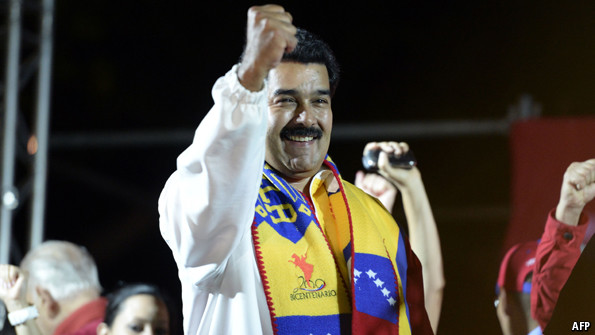Venezuela's local elections
A country divided

A total of 335 municipalities and two metropolitan districts were up for grabs in Sunday's poll. In 2008, with Chávez at the height of his power, a divided opposition managed to hang on in just 15% of them. Its consolation prize that year was to seize metropolitan Caracas, but the punishment was severe. The government cut off central funding to mayor Antonio Ledezma, ejected him from city hall and transferred most of his powers to an unelected ‘chief of government’. It is a measure of the city’s repudiation of the ruling United Socialist Party (PSUV) that it re-elected Ledezma, albeit by a whisker, in the certain knowledge that the embargo will continue.
As expected, the MUD made important advances in urban districts. It held on to the second city, Maracaibo, and now controls at least seven of the 23 state capitals, including four of the five biggest. The PSUV held strong in rural areas, however. Though much more thinly populated, these account for the vast majority of municipalities. The government also fended off a challenge to its most important electoral asset, Libertador municipality, which covers the western half of Caracas and includes the historic heart of the city. The opposition’s biggest disappointment was that it fell well short of its goal of polling more votes than the government nationwide. With over 97% of the votes counted, the PSUV and its allies had obtained more than 49% and the MUD and its allies less than 43%. Independents and dissidents accounted for the rest.
A result like this, amid the country’s worst economic crisis in 30 years, is testimony to the efficiency of the government’s electoral machine, and to its lack of scruples in employing all the resources of the state for partisan advantage. Vicente Díaz, the only opposition-leaning member of the five-strong board of the National Electoral Council (CNE), said this was the most unfair election in modern Venezuelan history. With the government’s grip on radio and TV now almost complete, the opposition was rendered virtually invisible in media terms.
But whatever the excuses, the opposition leader, Henrique Capriles, will need to do some hard thinking about where to go from here. After April’s close-run presidential election, which Mr Capriles lost by under two percentage points, the MUD disputed the result. But the CNE and the supreme court refused even to consider their case. There will be no more elections until the parliamentary vote in 2015.
Mr Maduro, too, faces difficult questions. A burgeoning economic crisis requires urgent solutions. Annual inflation is over 50% and many staple products, including milk, flour and toilet paper, are difficult to obtain. Power cuts are frequent and violent crime is at record levels. Short of foreign reserves and with a massive fiscal deficit, the government is expected soon to announce another major devaluation of the currency, whose official value is ten times what it fetches on the black market.
Officially, the government proclaims itself the victim of an economic war waged by the ‘fascist’ opposition and its allies in Washington, DC. Mr Maduro’s proposed solution is to accelerate the implementation of Chávez’ radical statist agenda. Some think that with the elections out of the way he will be freer to seek a more pragmatic solution to the crisis, including a rapprochement with the private sector. The alternative could be severe social unrest and a further crackdown on dissent.
No comments:
Post a Comment